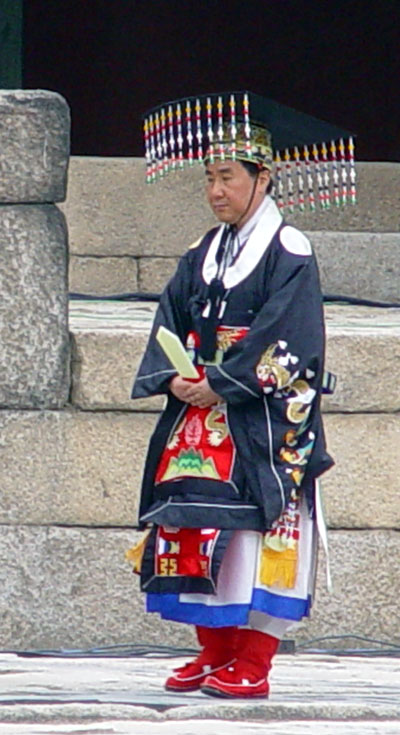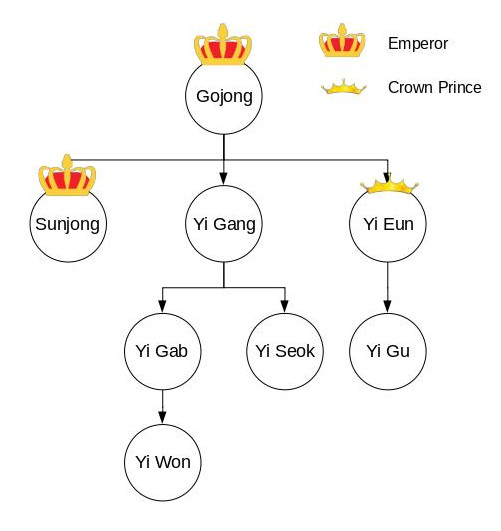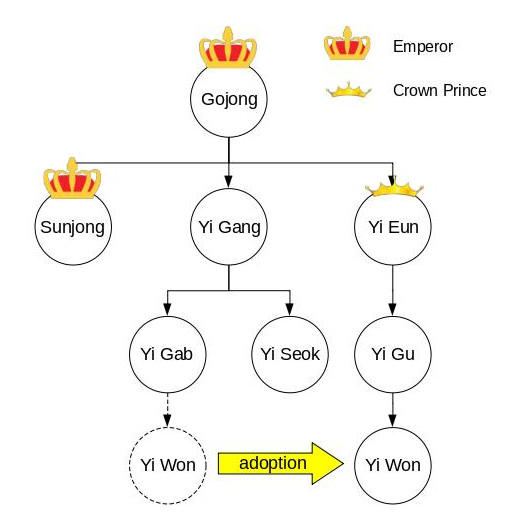Recently I was amused to read that Andrew Lee, the claimed “Crown Prince of Korea,” took over the Freenode IRC network. I mean, not the part where he took over Freenode, of course, which is a shame and I hope users will find a better home if he can’t be removed.
The part that amused me was that he claimed to be the Crown Prince of Korea, because a) that title doesn’t exist anymore because neither Korea is a monarchy anymore–or at least not the same monarchy, in the case of the North–and b) to the extent it exists, it belongs to someone else entirely and Andrew Lee has no claim to it.
Why is that, and who is the “real” Crown Prince of Korea? Dive down that rabbit hole with me if you like royal family trivia and/or history.
Andrew Lee: The case for and against
First of all, let’s look at Andrew Lee’s claim to this title. The claim is that Yi Seok, a grandson of Gojong who was the last king of Joseon and the first Emperor of the Daehan Empire, passed on the title to Lee in October of 2018. (“Lee” and “Yi” are romanizations of the same Korean surname 이(李). I will use “Yi” for Korean names because it is the more modern and phonetically correct one. I will also put the surname first for Korean names.)
It’s true that Yi Seok is one of the grandsons of Emperor Gojong and a member of the royal family. He is not, however, in the direct line of the last Crown Prince of Korea, and therefore cannot pass the title on. It’s also been pointed out that Andrew Lee has never made clear what his family ties to Yi Seok or the Korean royal family are, and if he is not a member of the royal family he is not eligible for any royal title in the first place.
The real Crown Prince (sort of)
So is there an actual Crown Prince of Korea? Well, technically, no. The last guy to hold the title died in 1970 and he lost the title itself in 1910 when Japan took over Korea, and it was never restored because the monarchy was abolished. The title of Crown Prince, in other words, has not existed in 110 years and the last person to hold it has been dead for over 50.
But also, sort-of kind-of, yes? While the former royal family, the Yi family from Jeonju, no longer holds political power in Korea (individuals might, of course, but due to being elected in their personal capacity and not by family affiliation), the eldest man in the direct line of the former Crown Prince is acknowledged as the head of the family and holds rites for the royal ancestors. His title is not Crown Prince, however, far less King, but the Rite-Giver (봉사자, 奉祀子) for the Daehan Royal Family. As the former royal family they’ve decided to recognize the royal line and pay respects to the old kings, a millennia-old tradition in cases where a royal family that lost power survives.
It’s a strictly private title, of course, and has nothing to do with official government designation or power. The Jeonju Yi family as a private association could call a dancing monkey their Rite-Giver and would be perfectly within their legal rights to do so. They could also call the monkey (or anyone they chose) the Crown Prince and it would be as legal as it is officially meaningless, much like Andrew Lee’s title.
The head of the former royal family and their Rite-Giver is not a monkey.
Nor is it Yi Seok or Andrew Lee.
It’s this guy:

Figure 1: Yi Won
This is Yi Won, great-grandson of Gojong and grandson of Yi Eun, the aforementioned last Crown Prince of Korea. Or, if you go by legally recognized terms, the grandson of Yi Gang, Yi Eun’s brother. I told you this was a rabbit hole.
…Why?
But wait, didn’t I say Yi Seok is a son of Yi Gang, making him Yi Won’s uncle? So why is Yi Won ahead of him in the family’s pecking order? Also what’s this about Yi Won having two different grandfathers?
This all goes back to the three sons of Gojong, who was the 26th king of Joseon and first Emperor of the Daehan Empire. Gojong’s eldest surviving son Cheok became Sunjong, the second and soon last Emperor when Japan took over the country in 1910. Sunjong had no son, so his Crown Prince was his younger half-brother Yi Eun, the last person to hold this title.
These two princes’ half-brother, Yi Gang, had a whopping 21 children. The 10th son is Yi Seok while the 9th son, Yi Gab, had two sons and a daughter, the eldest son being Yi Won.
Here comes the family tree, a vastly simplified one of course that omits everyone who is not directly mentioned in this particular story (siblings arranged left to right in birth order):

Figure 2: A pared-down Korean royal family tree
So the first reason Yi Won has more seniority than Yi Seok and gets to be the head of the royal family is that while Yi Seok is older, Yi Won is the son of the older brother and that makes him more senior by direct line.
The more important reason, though, is that he was “adopted” under traditional family law that is no longer valid in Korea to Yi Eun’s, that is the former Crown Prince’s, line. Yi Eun’s son Yi Gu did not have sons, which broke the direct line of the Crown Prince. In order to carry on that line, Yi Won became Yi Gu’s adopted son.

Figure 3: Yoink!
The problem under modern Korean family law is that the “adoption” happened after Yi Gu’s death, which makes it legally invalid. Posthumous adoption of a male relative to carry on a broken family line, however, was fairly common in Korea prior to the 20th century. Even if it’s no longer legally valid, the Jeonju Yi family as a private association can decide its own rules of succession, and if they decree that Yi Won is Yi Eun’s grandson by posthumous adoption, they’re free to do that. This would not be valid for the purpose of inheritance and other matters under Korean law, but for deciding who the family decides is its own head? Why not.
Just be glad it wasn’t a monkey. Or Andrew Lee.